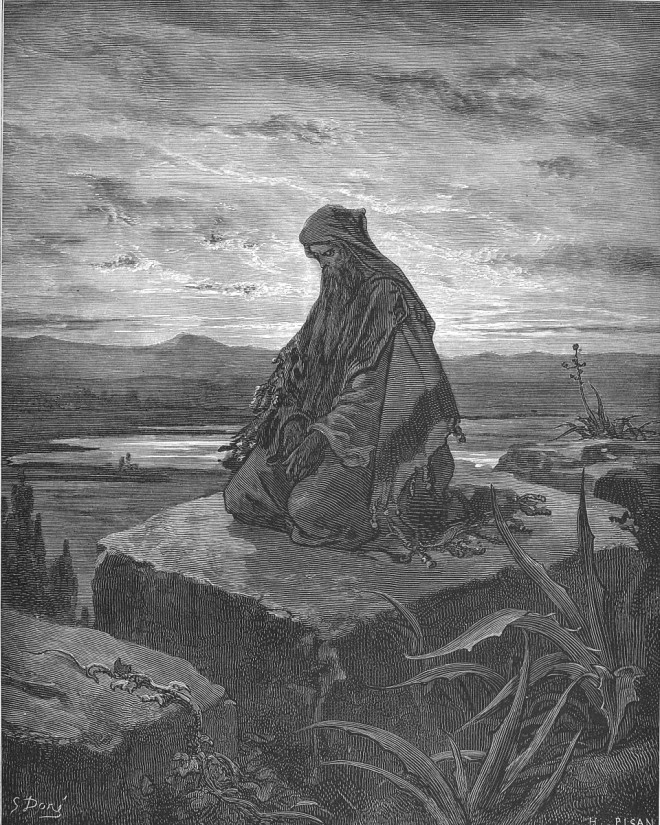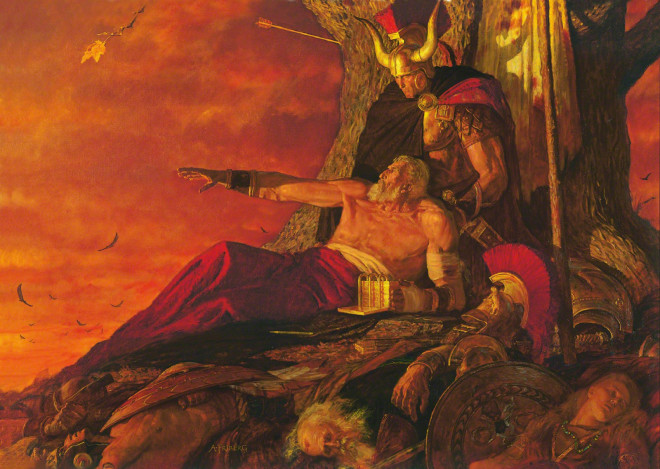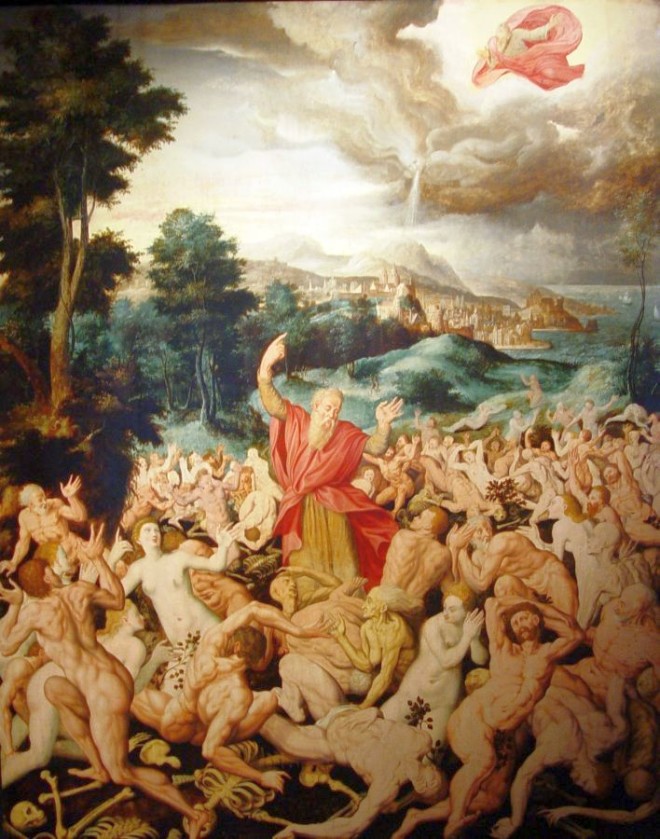I don’t think it’s a coincidence that the Nephite prophet, Mormon, chose to open the Book of Mormon with the story of a man who has visions and, in sharing them, is rejected. Why would Mormon choose this story for us to read in the last days, the days before the end of the world as we know it?
As the editor of the “Book of Mormon,” Mormon kept many historical records, and he chose Lehi’s story for the first chapter of his abridgment of all these records.
Maybe there’s a reason he shares the story of Lehi, a man who is ridiculed for being a visionary man — A man who sees the future of his city — A man whom the Lord warns to take his family and leave the city of Jerusalem before it is destroyed. This is the classic example of what Isaiah teaches us,
Go now, write on tablets concerning them;
record it in a book for the end-time,
as a testimony forever. (Isaiah 30:8)
Jehovah commands prophets in every age to record the events of their day, both good and evil, for the benefit of posterity: (1) of evil, to illustrate the consequences of his people’s actions; and (2) of good, to show that Jehovah at all times delivers those who keep the terms of his covenant. (Avraham Gileadi, Analytical Commentary)
Hugh Nibley explains that Lehi was ridiculed for being a visionary man:
He is the piqqeaḥ, the sharp seer. He is a man who sees something that other people don’t see, but it is real. Such people were held in suspicion then. This is what Torczyner said, “They looked down upon them as being visionary.” See what Laman and Lemuel said about their father.
Torczyner said, “This means the open-eyed or the visionary man [he underlined visionary], the seer, the man whose eyes God has opened to see the things that others do not see. To the followers of the prophets this was the highest term of praise, but for his critics it was a term of derision.”
This is what the brothers say to Nephi already in the second chapter, “They did murmur in many things against their father, because he was a visionary man . . . He was a piqqeaḥ, and that’s what they accused him of being, “visionary.” These are exactly the qualities that Lehi reverenced and treasured, and he had them himself. (Teachings of the Book of Mormon, Hugh Nibley)
People are still suspicious of anyone who is a visionary. Some critics are like Laman and Lemuel in their accusations, taking quotes out of context to support their negative opinion. Gregory Smith (whom I disagree with) at FairMormon.org writes a scathing review condemning “Spencer,” a visionary man whose visions and near-death experiences are told in the book, Visions of Glory.
I believe Spencer to be a visionary man. His visions of the end-times have been recorded. Like the visions of Isaiah, Ezekiel, Joel, and Lehi, his visions have been rejected, as were/are the visions of Joseph Smith. [I realize there are imposters, but that is part of this world, and you can find the truth.]
People today are not much different from the people in the opening story of Lehi when Laman and Lemuel complain about their father, who is a visionary man, saying: “We are fools to leave Jerusalem…The people of Jerusalem were righteous, for they kept the law of Moses.”
No one likes to hear that they need to repent. No one likes to hear about impending doom. But maybe we should look at that opening chapter of The Book of Mormon and the story of Lehi. That example is for us.
Moroni saw our day and likened it to the histories of his people, who were eventually destroyed. “Behold, I speak unto you as if ye were present, and yet ye are not. But behold, Jesus Christ hath shown you unto me, and I know your doing.” (Mormon 8: 35)
Isaiah saw our day and chose to write in prose and symbols and many layers — so that his message would stand the age of time. Isaiah may be considered a sealed book in that only those who have ears to hear will be open to his message.
Because Isaiah’s day serves as a type of the “end-time” (yom ’aharon) (Isaiah 44:7; 46:10), his recording it in a “book” or “scroll” (seper) and on “tablets” or “plates” (luah) ensures its preservation until that day. (Analytical Commentary of Isaiah, Gileadi)
I foretell the end from the beginning,
from ancient times things not yet done.
I speak, and my purposes take effect;
I accomplish all my will. (Isaiah 46: 10)
Moroni admonishes us to search Isaiah, the visionary man: “Search the prophecies of Isaiah. Behold, I cannot write them.” (Mormon 8:23) And yet, today, few people search, even though a man (Avraham Gileadi) has devoted a lifetime to understanding them and has provided us with keys to understanding Isaiah. In fact, Gileadi has been rejected in times past because of his interpretation of Isaiah.
Isaiah is the back story of Spencer’s visions.
If there were visionaries in the past, there will be visionaries today. The men and women who shared their visions in the past are believed to be true, or we would not have them in the books we call scriptures. We would not believe Joseph Smith if we do not believe that men and women can have visions from God and feel prompted or even commanded to share them. To say that these experiences are too sacred and should not be shared may be true in some circumstances (do not cast your pearls before the swine, do not put up a stumbling block for your neighbor), but it is also true that some people are seeking greater light and knowledge and ready for more than milk. Some visionaries are called to share their visions. Some are told to not share them.
We have current-day visions to understand life, and we have past-day visions to understand life. And Mormon, Moroni, and Isaiah have asked us to study and heed them. I acknowledge that we can be deceived, but I also have a testimony that God will confirm to you true messengers. He has done this for me. And sometimes visionaries will not be general authorities. We must turn to God and not rely on our leaders for our testimony. Others can have visions from God, showing them the end times.
The apostle Peter preached to the crowd, declaring that in the last days, men and women will have visions:
And it shall come to pass in the last days, saith God, I will pour out of my Spirit upon all flesh: and your sons and your daughters shall prophesy, and your young men shall see visions, and your old men shall dream dreams:
And on my servants and on my handmaidens I will pour out in those days of my Spirit; and they shall prophesy:
And I will shew wonders in heaven above, and signs in the earth beneath; blood, and fire, and vapour of smoke:
The sun shall be turned into darkness, and the moon into blood, before that great and notable day of the Lord come. (Acts 2:16 -19)
Originally posted August 2015. Updated April 2021.



